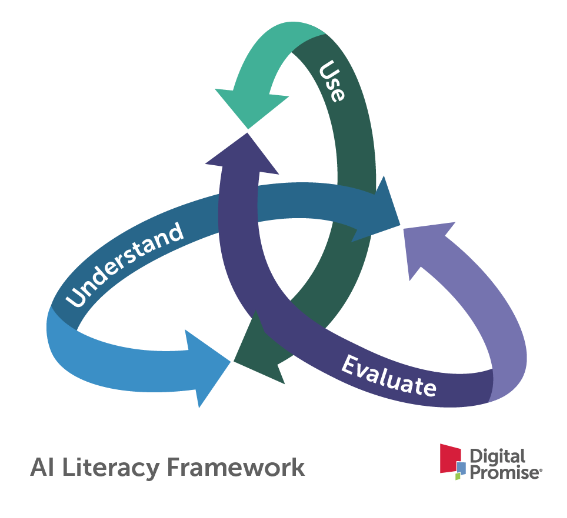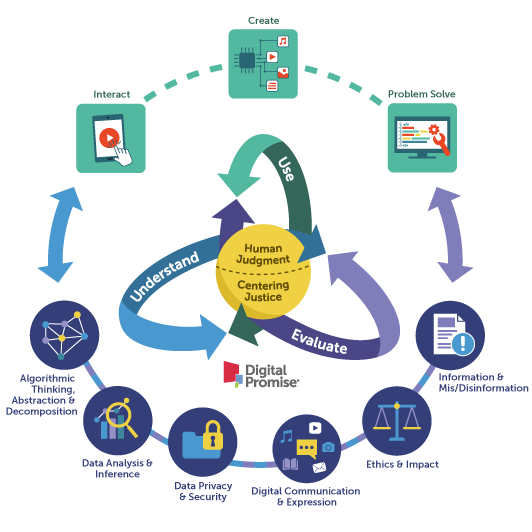
As AI becomes increasingly prevalent in our daily lives and educational settings, it is imperative to equip learners, educators, and leaders with the necessary skills and knowledge to navigate this technology responsibly. We envision safe, equitable, and meaningful AI and emerging technologies that improve education by enhancing how we teach and learn. Thus, AI literacy has emerged as a skill set for everyone to safely and effectively use these emerging technologies.
AI literacy includes the knowledge and skills that enable people to critically understand, evaluate, and use AI systems and tools to safely and effectively participate in an increasingly digital world.

Figure 1. AI Literacy Framework includes three components: Understand, Evaluate, and Use
Our framework defines three interconnected Modes of Engagement to support robust engagement in AI literacy, including:

Figure 2. Expanded AI Literacy Framework, including Core Values, Modes of Engagement, Types of Use, and AI Literacy Practices
Our expanded AI Literacy Framework depicts the relationship between AI Literacy Practices, Core Values, Modes of Engagement, and Types of Use and elaborates essential components of AI literacy to support educational leaders in adapting it to their contexts.
Table 1. Components of expanded AI Literacy Framework
| Framework Component | Description | Examples |
|---|---|---|
|
AI Literacy Practices |
Actionable practices of understand and evaluate that learners can demonstrate |
Data Privacy & Security, Information & Mis/Disinformation |
|
Core Values |
Underlying principles that support learners to safely and effectively use AI tools |
Human Judgment, Centering Justice |
|
Modes of Engagement |
Interconnected ways users can engage with AI-enabled tools in order to demonstrate AI literacy |
Understand, Evaluate, Use |
|
Types of Use |
Distinct purposes for which users engage with AI-enabled tools |
Interact, Create, Problem Solve |
| Framework Component |
AI Literacy Practices |
|---|---|
| Description |
Actionable practices of understand and evaluate that learners can demonstrate |
| Examples |
Data Privacy & Security, Information & Mis/Disinformation |
| Framework Component |
Core Values |
| Description |
Underlying principles that support learners to safely and effectively use AI tools |
| Examples |
Human Judgment, Centering Justice |
| Framework Component |
Modes of Engagement |
| Description |
Interconnected ways users can engage with AI-enabled tools in order to demonstrate AI literacy |
| Examples |
Understand, Evaluate, Use |
| Framework Component |
Types of Use |
| Description |
Distinct purposes for which users engage with AI-enabled tools |
| Examples |
Interact, Create, Problem Solve |
Informed users are essential for the safe and effective use of AI. We call on school leaders and policymakers to champion AI literacy for all learners, educators, and community members. Together, we can ensure the responsible adoption of emerging technologies.
Want to know more about AI literacy? Find more resources here: